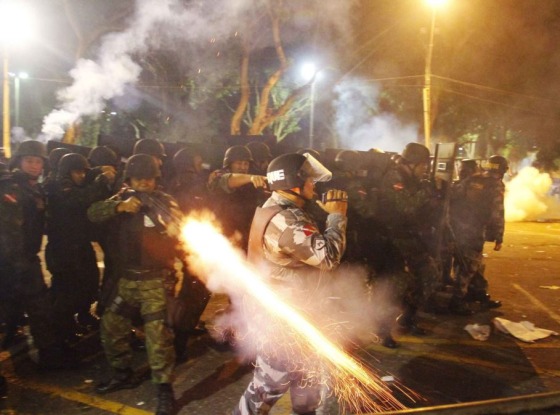On 15 June, the ninth FIFA Confederations Cup 2013 began in Brazil and will conclude by the final match between Spain & Brazil which will be held on 30 June.
FIFA Confederations Cup is an international tournament which takes place every four years as a rehearsal for the FIFA World Cup. Since 2005, the tournament is being held in the nation that will hold the World Cup. There are eight teams contesting: the holders of each of the six FIFA Championships, FIFA World Cup holder and the host nation.
Apparently, Brazilians aren’t happy with hosting neither the confederations cup nor the world cup, that even rumors were spread about cancelling the Confederations cup.
Earlier this month, protests started in over 100 cities in Brazil, as they refuse the extreme government funding of major sports events while ignoring the country’s situation and the high cost of living that even transpirations ticket prices are increased.

According to Reuters, during the opening match, more than 30 people were injured and 22 arrested as police used rubber bullets and tear gas to disperse protestors, yet the match took place and Brazil won 3-0 over Japan.
Up until today, the tournament succeeded to keep going. Both Brazil and Italy were qualified to the semi-final from Group A, and Uruguay and Spain from Group B.

Although Tahiti lost with a combined score 24-1, they earned all fans respect and became fans favorite. After losing 8-0 to Uruguay on their last match in the confederations cup, the team players held a banner saying “Obridago Brasil!” which means Thank you Brazil in Spanish. Tahiti is the smallest nation to ever compete in FIFA finals.
For the semi-final matches, Spain managed to reach the finals by winning 7-6 (penalties) over Italy, and Brazil winning 2-1 over Uruguay lead them to finals.
There are still concerns on whether there will be more clashes during the final matches on 30 June or not, yet there are no statements on cancelling either match. Uruguay and Italy will be fighting for the 3rd place, while current champions, Spain will be defending their title with five times champion, Brazil.
Will the Five time champions win their title back after the return of Luiz Felipe Scolari, the manager who led them to the World Cup title back in 2002? Or, Will Spain defend their title and prove that they are still the Champions?
Another big question is whether politics will interfere with sports, and whether Brazilian protesters might use the attention for the World Cup to let their demands be heard? There are many questions yet to be answered, but one thing that we are sure about is that on 30 June both Spain and Brazil will play a historical match.


